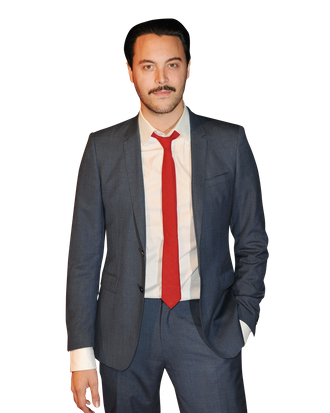
[Spoilers ahead] Richard Harrow, we hardly knew ye. As soon as we saw the sun on Jack Huston’s full face, after he made his way towards his sister, wife, father-in-law, and adopted son on a house porch, we knew it was over for him. This is how Richard saw himself or wished himself to be — not disfigured, not masked, but beautiful and loved. And then we saw him as he truly was: alone, under the boardwalk, mask discarded — dead from a wound inflicted during the gunfight where he tried to kill Dr. Narcisse (as a last favor to Nucky in exchange for finally disclosing the location of Jimmy Darmody’s body). Huston, who is in London performing in a production of Strangers on a Train on the West End, called up Vulture to chat about what he called his “most beautiful ending,” the phone call that ended it all, and hustling back and forth between this and David O. Russell’s American Hustle.
Do you think fans are going to be devastated? Richard was so beloved …
And I loved him, too. I think maybe that’s what transcended. I never saw him as a bad guy. I know he was a killer, and he was incredibly good at it, but it was sort of a necessity. That’s what he felt he was there to do. And he was probably the most conflicted character. In constant turmoil. Always battling all these different conflicts: good, bad, being a soldier, being a friend, having a family, not having a family. Morality. Falling in love. All these amazing questions. So I loved the character so much, so I understood why people loved him, because I loved him, too. And killing that many people was kind of fun, too. [Laughs.]
People would dress up as him for Halloween.
I know! One year, I got so many photos from so many people at different parties dressed as Richard Harrow, and that was the coolest thing ever. I would get so many e-mails from people saying, “Richard’s here!” He’s a very good character for Halloween, with the mask and everything.
How did you first find out this was happening?
You get the infamous phone call. Normally if [showrunner] Terry [Winter] wants to tell you something, you get an e-mail. So if you get the phone call, “Terry’s trying to get ahold of you,” you know what’s going to happen. But I was pretty much prepared for it. I sort of knew it was going to happen.
How? Why?
This is an awful way to say it, but it’s absolutely true: If he had just carried on, being married to Julia and taking care of the kid, that wouldn’t be fitting. I mean, he’s a wonderful surrogate father, because it was like his pact with Jimmy, taking care of Tommy, was the one thing Jimmy would have wanted, but Richard needs to be fighting for something. What one realizes about tragic characters is the moment they get everything, that’s the moment they die. When everything you’ve ever wanted happens for you, that’s when everything starts to go wrong. It’s inevitably going to be the end. And he had an honorable death. Richard knew he wasn’t going to come back from this. Before Jimmy went to his death, he goes, “This is something I have to do.” He chose to die. And I think Richard was doing the same thing. He knew he was going to his death.
Terry wrote a fake ending so that people who saw the script wouldn’t know what was coming. What was in the alternate ending?
Basically, at the end, you just think I made it back to the farm. And it didn’t include me dead under the boardwalk. That just got slipped in at the very end. That was the last thing we shot, so it was emotional for everyone. The hard part is not getting to work with all these people, but they’ll be friends for life, and I’m sure we’ll get to work together, hopefully many more times, in the future.
Do you keep in touch with Michael Pitt?
Oh, yeah, yeah! I just saw Mike the other day just before I left, actually. We’re still very close. It was so weird, he actually called me the day I found out I was getting killed off, but I couldn’t tell him. I told him, “Wait a few months, and I’ll tell you why it’s so bizarre that you called today.” Because we had been filming, so I hadn’t spoken to him during that three months. It was crazy. But he’ll freak out.
Did any of your gangster expertise on Boardwalk help in playing your gangster role in American Hustle?
I guess it did! I guess because I’m integrated into that lifestyle by doing the show, it might make it a little easier. No matter if I’m playing Richard Harrow, I’m still on a show about gangsters. And David O. Russell is so brilliant. I didn’t even see the script. I got the part through improvisation, like, he just sent me an idea of what he wants the character to be. And then, on set, David will be saying lines in the moment, he’ll rewrite scenes as you go along, and it’s amazing to watch him work. What he did, he managed to shoot a film that should have taken twice as long to shoot. I’m excited to see it, but shooting it, it’s all a bit of a blur. I was doing American Hustle, doing the show, and having a baby — all at the same time. I was doing the show, I went to do American Hustle, got a train back on Saturday morning, had the baby that night, got on a train on Sunday, and went back to American Hustle, and then came back to the baby and the show. So it was pretty mental!

